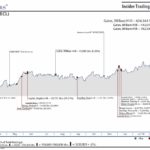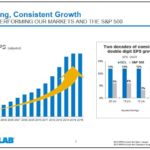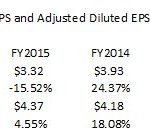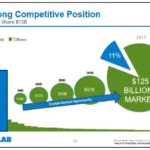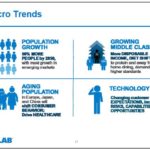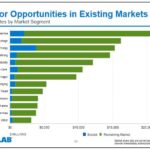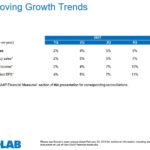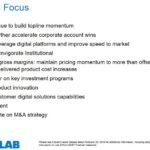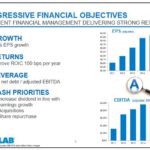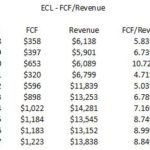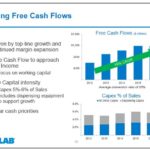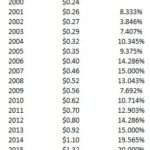Contents
Summary
- Ecolab (ECL) has a track record of two decades of double digit EPS growth.
- It is a very low capital intensive company with highly consumable products/services thereby resulting in a predictable and highly recurring revenue stream.
- Bill Gates has held a position in ECL for some time and just recently acquired another ~1.3 million shares.
- As with most other stocks I have recently analyzed I view ECL as a bit expensive.
Introduction
Based on my personal experience I have found that following the investment activity of Warren Buffett (through Berkshire Hathaway) and Bill Gates (through the Bill & Melinda Gates Foundation Trust or Cascade Investment LLC) is a good way for me to get investment ideas.
I recognize that by the time their investment activity has been publicly disclosed the share value of the companies in which they have invested has undoubtedly changed. Furthermore, the magnitude of their purchases is far greater than what can afford. As a result, they are probably obtaining a better deal than I could expect to achieve even if I acquired shares on the same days of their purchases.
I have no control over this but my thought process is that these wealthy individuals are making long-term investment decisions and are not merely looking at where a company’ stock price will be in 6 months or a year from now. Based on my understanding of their investment strategy, they look for a reasonably valued high quality company whose business model is relatively easy to understand.
The challenge we have in the current market environment is that there are very few high quality businesses that are reasonably valued. This is why my interest in Ecolab Inc. (NYSE: ECL) was piqued when I noticed that Bill Gates had very recently acquired another ~1.33 million shares in the company.
A quick cursory review of ECL’s most recent Investor Day presentation revealed that ECL has a track record of two decades of double digit EPS growth.
Source: ECL Investor Day Presentation – September 7, 2017
I also reviewed ECL’s 10-K reports and compiled the following data regarding ECL’s diluted EPS and adjusted diluted EPS.
After quickly reviewing high level information about ECL I have decided to take a closer look at whether ECL would be a worthwhile addition to our overall holdings.
Business Overview
ECL, which had ~48,000 employees as at December 31, 2017, was incorporated in 1924.
It has in excess of one million customer locations and it works with customers in more than 40 industries.
ECL estimates that its addressable market in 2017 was $125B+. It operates in a highly fragmented market given that it is the biggest player and it only has a ~11% market share.
Source: ECL Investor Day Presentation – September 7, 2017
Source: ECL Investor Day Presentation – September 7, 2017
It is the global leader in water, hygiene and energy technologies and services. It delivers comprehensive programs, products and services to promote safe food, maintain clean environments, optimize water and energy use, and improve operational efficiencies for customers in the food, healthcare, energy, hospitality and industrial markets in more than 170 countries; ~47% of ECL’s net sales originated outside the United States.
ECL’s cleaning and sanitizing programs and products, and pest elimination services, support customers in the foodservice, food and beverage processing, hospitality, healthcare, government and education, retail, textile care and commercial facilities management sectors. Its products and technologies are also used in water treatment, pollution control, energy conservation, oil production and refining, steelmaking, papermaking, mining and other industrial processes.
ECL provides food safety technology for more than 25% of the world’s food processors and for more than 40% of the world’s dairy producers. ECL has been the single most influential factor on milk shelf life over the last 40 years according to ECL’s Chairman of the Board and CEO.
It provides water technology for power plants that generate more than 20% of the world’s electricity. In addition, it deals with ~40% of the world’s nuclear power plants.
ECL manages over 1 trillion of gallons of water per year and its technology has helped save over 200 billion gallons a year of water.
The company has 10 operating segments which have been aggregated into the following reportable segments:
- Global Industrial – Water, Food & Beverage, Paper, Life Sciences, Textile Care
- Global Institutional – Institutional, Specialty, Healthcare
- Global Energy
- Other – Pest Elimination
It directly operates in ~100 countries outside the US through wholly-owned subsidiaries or, in some cases, through a joint venture with a local partner. In certain countries, selected products are sold by its export operations to distributors, agents or licensees. The volume of these sales is not significant in terms of ECL’s revenues.
Competition in the Global Industrial segment consists of a few large companies. There are also some markets which are served by smaller entities which focus on more limited geographic regions or a smaller subset of products and services. ECL competes on the basis of demonstrated value, technical expertise, chemical formulations, customer support, detection equipment, monitoring capabilities, and dosing and metering equipment.
The Global Institutional and the Other reportable segments have two significant classes of competitors. There are a few large companies selling directly, or through distributors, on a national or international scale. In addition, there are numerous smaller regional or local competitors. They focus on more limited geographies, product lines and/or end-use customer segments. ECL’s competitive advantage is that it provides superior value, premium customer support and differentiated products to help customers protect their brand reputation.
The Global Energy reportable segment competes with a limited number of multinational companies. There are also several smaller, regional niche companies focused on limited geographic areas. ECL competes on the basis of its product quality, technical expertise, chemical formulations, effective global supply chain, strong customer service and emphasis on safety and environmental leadership.
During the Q&A segment of ECL’s Chairman of the Board and CEO presentation at JP Morgan’s Aviation, Transportation, and Industrials Conference on March 13, 2018, a question arose as to the risk posed from Amazon’s possible entry into ECL’s business. He indicated they have huge respect for Amazon but ECL is not competing on the basis of price. What ECL’s customers have found is that while they might be able to purchase products from ECL’s competitors at lower prices, there is a cost to not having ECL’s solution based offering.
By having more than 7,700 patents covering its unique technologies, ECL is able to sell its solutions at 10-20% price premiums relative to the competition.
‘Price is what you pay. Value is what you get.’
While the price of ECL’s products might be higher, their products deliver meaningful savings over a period of time in the form of less waste, greater energy efficiency. This eventually results in ECL’s products being less expensive relative to competitors’ products.
ECL’s biggest advantages, however, are people and dependable service quality. All these advantages are what help ECL grow even though their products are priced higher than those offered by its competitors.
Impact of the Tax Cuts and Jobs Act (TCJ) on ECL
ECL was impacted by the reduction in the U.S. federal tax rate, as it relates to deferred tax assets and liabilities recorded on the balance sheet, and the one-time transition tax that is imposed on unremitted foreign earnings. Provisional amounts have been recorded for the income tax effects that included the reporting period the Tax Act was enacted. These provisional amounts are subject to further adjustments during the one year measurement period following enactment of the Tax Act.
The reported income tax rate for Q4 2017 was (4.0%) compared with the reported rate of 23.9% in Q4 2016.
Ecolab recorded a net discrete tax benefit of $0.161B or $0.55/share in Q4 2017 as a result of the TCJ. This net discrete tax benefit is a result of the remeasurement of U.S. deferred tax assets and liabilities at a lower enacted U.S. tax rate partially offset by tax expense from the tax on deemed repatriated earnings of foreign subsidiaries.
Excluding special gains and charges and discrete tax items, the adjusted tax rate was 23.3% in Q4 2017 versus 24.7% for Q4 2016.
Q4, FY2017 Results and 2018 Outlook
On February 20, 2018, ECL released its Q4 and FY2017 results.
Source: ECL – Q4 2017 Presentation – February 20, 2018
ECL has significantly increased its investment in digital technology during the last 4 years and investment in this area is expected to be increased in 2018.
A takeaway from the ECL’s Chairman of the Board and CEO presentation at JP Morgan’s Aviation, Transportation, and Industrials Conference on March 13, 2018 is the leveraging of technology across the platform to help ECL’s employees become more productive.
In his presentation, he gave an example of how ECL employees attend customers’ sites, will retrieve information from the customers’ systems, and will then generate reports to help customers become more efficient. Through the use of digital technology the objective would be for all this information to be readily available for the Ecolab employees BEFORE going to customers’ sites.
The outlook for 2018 is:
- 47% – 48% Adjusted Gross Margin, excluding special gains and charges;
- 32% – 33% Selling, General, and Admin as a % of Sales;
- Net interest expense of ~$0.24B;
- ~22% adjusted tax rate;
- $5.25 – $5.45 Adjusted EPS, excluding special gains and charges
- ~292 million diluted shares outstanding – a reduction from ~294 million
Source: ECL – Q4 2017 Presentation – February 20, 2018
Source: ECL Investor Day Presentation – September 7, 2017
Credit Ratings
Moody’s currently rates ECL’s senior unsecured debt Baa1 with a stable outlook. This is the upper tier within the lower-medium grade range. S&P rates ECL’s senior unsecured debt A- with a stable outlook. This rating is the lower tier within the upper medium grade range and the outlook is stable.
Free Cash Flow (FCF)
FCF is a key metric upon I which I rely as part of my analysis as it cannot be easily manipulated with one-time charges or events as in the case of earnings.
I generally look for FCF/Revenue in excess of 10% as this level provides me with some comfort the company is generating sufficient cash flow. While ECL does not meet this hurdle, it is a very low capital intensive company with highly consumable products/services. As a result, it has a quite predictable, highly recurring revenue stream. As a result, even though ECL falls just short of my 10% threshold, I am not concerned.
Source: ECL Investor Day Presentation – September 7, 2017
Valuation
Upon release of its Q4 2017 results, ECL presented its 2018 adjusted diluted EPS forecast of $5.25 – $5.45 representing a 12% – 16% increase from FY2017. This forecast includes a ~$0.10/share benefit from the US tax law and $0.03/share reduction from the sale of the Equipment Care business.
ECL closed at $136.31 on the March 14, 2018. On this basis, the forward adjusted diluted EPS is ~25.5% when we use $5.35 (mid-point of ECL’s forecasted range) in adjusted diluted EPS. ECL is certainly not on sale but this level is consistent with historical PE levels; the exception would be during the Financial Crisis timeframe.
At JP Morgan’s Aviation, Transportation, and Industrials Conference, a question was posed by one analyst about ECL’s capital allocation strategy and in particular share buybacks; in the past there have been periods where ECL has done accelerated share buybacks. ECL’s Chairman of the Board & CEO indicated that share buybacks will be used to neutralize share dilution. The priority, however, is to ensure the business is being fed properly. ECL’s management wants to ensure the right amount of money is being spent to sustain and enable long-term future growth.
Increasing the dividend in line with earnings growth is a priority. This is followed by acquisitions and share repurchases. While ECL certainly has the ability to significantly increase its dividend and dividend payout ratio, the Board does not want to place ECL in a position where circumstances would require a dividend cut. Once a dividend is in place, any dividend cut is perceived to be some catastrophic sign of weakness.
Having said this, ECL has paid cash dividends on its common stock for 81 consecutive years.
On December 7, 2017, ECL declared an 11% increase in its quarterly cash dividend ($0.37 increased to $0.41/common share) payable January 16, 2018. This resulted in a new indicated annual cash dividend of $1.64 per share in 2018 and represents Ecolab’s 26th consecutive annual dividend rate increase.
ECL is unlikely to appeal to dividend yield hungry investors given that its dividend yield is typically sub 1.50%. Based on the March 14, 2018 $136.31 closing stock price, ECL’s $1.64 annual dividend yield is ~1.20%. ECL’s compound annual dividend growth rate between 2000 and 2018, however, is in excess of 11%.
If we use the mid-point ($5.35) of ECL’s adjusted diluted EPS forecast for 2018 we get a dividend payout ratio of ~30.6%. By maintaining a low dividend payout ratio, ECL retains sufficient cash to invest in the business and to pursue acquisitions.
Final Thoughts
The fact Bill Gates was prepared to recently increase his ECL exposure confirms my findings that ECL is a great long-term investment.
In my opinion, however, there is considerable market uncertainty at the moment given what is happening in Washington. I suspect that in the not too distant future there will be another sudden pullback in equity prices similar to that evidenced in early February. I will patiently wait for a better entry level and will not be initiating a position in ECL until such time. A price of ~$128 or less, which is what we experienced around February 8th, is a level at which I would consider initiating a position.
Thanks for reading!
Note: I sincerely appreciate the time you took to read this article. Please send any feedback, corrections, or questions to charles@financialfreedomisajourney.com
Disclaimer: I have no knowledge of your individual circumstances and am not providing individualized advice or recommendations. I encourage you not to make any investment decision without conducting your own research and due diligence. You should also consult your financial advisor about your specific situation.
Disclosure: I do not currently hold a position in ECL and do not intend to initiate a position within the next 72 hours.
I wrote this article myself and it expresses my own opinions. I am not receiving compensation for it and have no business relationship with any company whose stock is mentioned in this article.



